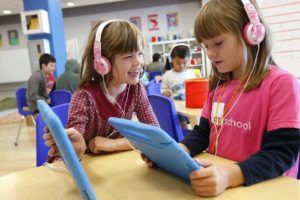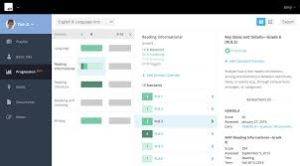AltSchool: Learning about Learning

AltSchool is using a data intensive approach to personalize K-12 education
Max Ventilla, the former Head of Personalization for Google, has set out to change the way that children learn. As he evaluated choices of schools for his own children, he asked the question, “why do schools continue to treat students as if they all liked the same thing and learned the same way?” To answer this question, Max has set out to build a company that not only changes the assumed way of educating children but also delivers a personalized learning experience that best fits each individual child.
AltSchool’s methodology combines traditional classroom learning with technology-enabled learning methods. However, it’s differentiation really lies in two elements: (i) the ability to collect and interpret data about the progress of a student and (ii) deliver a flexible tool that students can use to craft an individualized learning plan that suites how they learn best. AltSchool collects data from tablet based learning plans and associated data entry as well as cameras and microphones that are installed in classrooms to monitor progress of each student in much more detail than a teacher with a classroom full of students ever could. This data is accessible to parents and teachers to ensure student progress and to help each student advance along their educational journey. The depth of data collected on an individual has brought into questions concerns around data security and privacy that the company will have to manage.
In theory, AltSchool’s personalized learning philosophy should create tremendous value for children, parents, and society more broadly by ensuring that every child learns to their full potential leading to a more educated population with fewer children ‘falling through the cracks’.
One of the biggest challenges AltSchool has faced is figuring out how to test its software algorithms to understand how the product can be used and how to optimize the learning experience to ensure children are realizing positive outcomes from AltSchool’s personalized learning. To do this, AltSchool, developed its own ‘lab schools’ that implemented its technology as a form of beta testing. AltSchool’s current model to capture value is to charge students tuition to those who attend an AltSchool location. This tuition is quite expensive and somewhat comparable to private school tuition. The company is hopeful that with scale it will be able to substantially lower costs in order to make its schools available to the masses.
With multiple years of data across a number of schools, AltSchool is transitioning for the future of its business by partnering with traditional schools to implement its technology. In January 2018, AltSchool announced its first partnerships with public school districts, bringing the total number of school partnerships to 6. In this new business model, AltSchool will charge partners a per student fee to license their technology. The scalability of personalized learning was a key challenge that led to the shift in business model from physical school development to partnerships. As AltSchool attempts to deliver its service to a broader audience, understanding its ability to effectively scale its technology will be extremely important. In addition, it will be interesting to see if AltSchool’s personalized learning methodology and ability to optimize teaching through data driven insights ultimately leads to better student outcomes.
Do you think AltSchool will have an impact in changing how children learn?





Interesting Post. I love the idea of tracking student progress with data and increased granularity. I think that this is especially valuable to parents, who might otherwise just have student teach conferences twice a year and see an occasional exam score and report cards. I can understand why it is a challenge to perfect the algorithm, as no parent wants their child to be the guinea pig in a new technology. In addition, i worry about a curriculum being too technology based, as i think there is something very valuable about kids interacting with one another, rather than being totally engrossed with a device. Of course, this could just be integrated as a part of the curriculum to address this concern.
Hi! Great post. I think the potential for just having more transparency on analytics and student performance in the classroom can massively inform instruction and increase student ownership. I also wonder if through all of this data collection AltSchool might be able to identify different types of student learners. Today, we think about visual learners versus physical learners or auditory learners, but it would be so interesting to see if you could apply an unsupervised machine learning algorithm here to see if you could cluster students in any other way based on how they learn and if that might provide some important insights to teachers.
Thanks for this interesting post! The idea of personalized learning is intriguing. I think the learner-centered education really can benefit students and parents. However, I believe to really implement the idea is very difficult. Since each student may have a very different preference, need, and progress, this new model will create lots of burden on teachers. How could the teachers manage the whole class, while teaching content and designing activities for each student? In addition, although technology makes the learning easier, is learning on computer/iPad quietly really the right way for learning? After all, interacting with teachers and classmates is critical to the personal development of kids. I think the tool can be a good add-on for kids learning at home, but should not replace the school experience.
Thanks for sharing. Altschool seems to be pivoting by partnering with public schools, because it struggled to create value. Last year, it closed some of their schools: https://www.bloomberg.com/news/articles/2017-11-01/silicon-valley-tried-to-reinvent-schools-now-it-s-rebooting . There has been complaint by parents that their kids are being experimented on and it seems that there a lot of implementation challenges: http://www.businessinsider.com/altschool-why-parents-leaving-2017-11 . Nevertheless, I do believe that data and machine learning could be very useful for schools to help students improve their learning and personalize their learning. It just needs to be done in conjunction with the current schooling systems. A good company to look at is Knewton who provides such a solution.